From December 28, 2024, to January 6, 2025
Empowering Farmers to Embrace Sustainable Food Production
From December 28, 2024, to January 6, 2025, Volunteers Initiative Nepal (ViN) hosted a transformative 10-day training on Permaculture for Sustainable Food Production in Okhaldhunga. The training was divided into two groups, each attending for 5 days. The first group participated from December 28 to January 1, and the second group from January 2 to January 6. This initiative aimed to empower farmers with environmentally friendly farming practices that enhance soil health, increase crop yields, and protect the environment.
Bibek Dhital led the training session with Hasera, a well-known expert in sustainable agriculture. This initiative, funded by the Taiwan Fund for Children and Families, is part of ViN’s ongoing commitment to “Empowering Vulnerable Families” through regenerative agriculture.
 Why This Training Was Needed
Why This Training Was Needed
Nepal’s dependence on modern agricultural methods has resulted in declining soil fertility, excessive pesticide usage, and a considerable environmental burden. According to a 2022 FAO report, Nepal loses over 23% of its arable land each year due to poor farming practices. Farmers in Okhaldhunga face particular vulnerability, as erratic weather patterns and limited access to resources worsen their challenges due to climate change.
ViN recognized the need to transition to natural farming based on permaculture principles. The training, which centered on agroecology, aimed to enhance soil health, increase crop diversity, and improve the resilience of farming systems to climate change.
Day 1: Understanding Current Agricultural Practices
The training began with introductions and discussions about objectives, fostering an engaging and collaborative atmosphere. The facilitator emphasized the critical challenges facing modern agriculture, such as excessive chemical usage, declining soil fertility, and threats to biodiversity. These issues underscored the urgent need for eco-friendly farming methods.
Participants shared their experiences, identifying local agricultural challenges such as pest infestations and soil degradation. The group explored sustainable solutions based on organic farming, agroecology, and regenerative agriculture to address these issues. Discussions emphasized the role of permaculture in promoting natural agriculture and ecological farming practices that prioritize harmony with nature.
The day’s hands-on activities involved setting up light traps and insect zoos, enabling farmers to observe pest behavior and learn about natural pest control strategies. A documentary on the harmful effects of pesticide poisoning powerfully illustrated the long-term dangers tied to conventional farming methods.
The key takeaway from Day 1 was clear: transitioning to sustainable agriculture through organic food production and biodynamic farming is vital for developing resilient and eco-friendly agricultural systems.
Day 2: Soil Health and Nutrient Improvement
Healthy soil serves as the foundation for sustainable food production. Day 2 emphasized the significance of soil health in achieving successful organic farming. Participants conducted soil tests using samples from their fields, identifying nutrient deficiencies and imbalances in the soil.
The practical session covered the preparation of super compost, an organic and nutrient-rich mixture essential for regenerative agriculture. Farmers learned to use readily available materials to create compost that improves soil fertility without depending on chemical fertilizers.
Participants also viewed a documentary showcasing techniques such as double-digging and mixed cropping, which enhance soil aeration and optimize planting patterns. These methods illustrate ecological farming principles, ensuring long-term soil productivity while minimizing environmental impact.
By the end of the day, participants gained a deeper understanding of how natural farming practices support healthier soils, improved yields, and more sustainable ecosystems.
Day 3: Seed Preservation and Economic Analysis
Seed diversity is a cornerstone of sustainable agriculture, and Day 3 highlighted its significance. Participants visited a seed expo, where they explored various local seed types and learned how agroecology depends on biodiversity to ensure food security and build resilience against climate change.
The session introduced the idea of “seed as a weapon,” highlighting the importance of saving and sharing seeds. Farmers also laid the foundation for creating a community seed bank, which is crucial in preserving local heirloom varieties.
The group then analyzed the economics of major crops. Discussions prompted farmers to balance profitability with sustainability, a fundamental principle of regenerative agriculture.
Practical activities included preparing and applying Effective Microorganisms (EM) solutions that enhance soil health and naturally boost crop productivity. Participants utilized these solutions to enrich planting beds, gaining valuable insights into organic food production methods.
Day 4: Climate Adaptation and Water Conservation
Adapting to climate change is crucial for the long-term sustainability of food production. On Day 4, farmers worked together to create crop calendars that reflect changing weather patterns, allowing them to optimize their planting and harvesting schedules.
Another key focus was water conservation, an essential aspect of ecological farming. Participants examined water-saving models like rainwater harvesting systems and mulching techniques. These strategies align with the principles of biodynamic agriculture, which integrates natural resources to sustain agricultural ecosystems.
Activities included revisiting the insect zoos created previously and learning effective pest management techniques. A documentary on composting toilets illustrated how sustainable waste management can tackle ecological challenges while benefiting agricultural practices.
The day’s lessons equipped participants with practical tools to build resilience against climate variability, ensuring the sustainability of their natural farming efforts.
Day 5: Pathway to Organic Farming
The last day of the training signified a shift from learning to action. Farmers discussed implementing organic farming techniques in their fields, exchanged ideas, and delineated concrete action plans.
Participants pledged to adopt at least one permaculture principle and integrate eco-friendly farming practices into their routines. This collective commitment strengthened the training’s goal of fostering community-driven change and empowering farmers to lead by example.
Local leaders attended the closing ceremony to celebrate the participants’ dedication and highlight sustainable agriculture’s broader importance in improving livelihoods. Leaders emphasized that adopting biodynamic farming and organic food production can enhance food security and create lasting ecological benefits.
The event concluded with deep gratitude and a renewed hope for a future in which regenerative agriculture transforms Okhaldhunga into a beacon of sustainable food production.
The closing ceremony included speeches from local leaders, such as Deputy Mayor Kedar Babu Basnet and Chairpersons Tirtha Bahadur Ghimire, Basanta Katwal, and Balaram Katwal. They supported ViN’s organic movement and highlighted its significance for the region’s future.
Impact and Testimonials
Participants left the training with a renewed sense of purpose. “I now understand the importance of regenerative agriculture. This training has shown me how to farm sustainably while protecting the environment,” said one farmer from Thulachhap.
“This training has opened our eyes to the possibilities of sustainable farming,” said Kumar Shrestha, a participant from Taluwa. “We now have the tools to enhance our yields while safeguarding the environment.”
Local leaders also praised the initiative, calling it a “game-changer” for the community.
FAQs Sustainable Agriculture and Farming Practices
- What is permaculture, and how does it work?
Permaculture is a sustainable agriculture system that mimics natural ecosystems. It combines organic farming, water conservation, and biodiversity to create resilient and eco-friendly farming practices. - How does organic farming benefit the environment?
Organic farming avoids synthetic chemicals, enhances soil fertility, and encourages ecological practices. It reduces pollution and fosters biodiversity, making it crucial for sustainable food production. - What are the principles of sustainable agriculture?
Sustainable agriculture emphasizes soil health, water conservation, crop diversity, and reducing environmental impact. It promotes practices like natural farming, agroecology, and efficient resource use. - How can I start an eco-friendly farm? Begin with small-scale organic food production. Use natural compost, practice regenerative agriculture, and incorporate water-saving techniques. To sustain ecological balance, include biodynamic farming.
- What is the difference between organic and conventional farming?
Organic farming relies on natural inputs, whereas conventional agriculture uses synthetic fertilizers and pesticides. Organic methods emphasize environmentally friendly practices and support long-term soil health. - How does regenerative agriculture improve soil health?
Regenerative agriculture enhances soil fertility through crop rotation, no-till farming, and cover crops. These practices enrich the soil and promote sustainable food production. - What are the benefits of biodynamic farming practices?
Biodynamic farming integrates soil care, crop rotation, and lunar cycles to enhance soil vitality. It supports agroecology, boosts productivity, and promotes sustainable farming systems.
- What is permaculture, and how does it work?
Conclusion
The 5-day permaculture training in Okhaldhunga has laid the foundation for a greener, more resilient farming future. By equipping vulnerable families with knowledge and tools for eco-friendly farming, ViN is truly empowering families and building futures.
This initiative serves as a model for other communities in Nepal to embrace sustainable food production. We can create a healthier planet, one farm at a time.
Call to Action
Join the movement for a sustainable future! Support ViN’s permaculture Practices initiative that empowers vulnerable farmers in Nepal to embrace eco-friendly farming practices. By donating, volunteering, interning, or partnering with us, you can help expand these transformative efforts that foster regenerative agriculture and organic food production—benefiting farmers, the planet, and all living beings.
Together, we can create resilient farming systems, protect soil health, and fight climate change. Your participation will leave a lasting impact on future generations.
Donate, Volunteer, Intern, or Partner with us today and force positive change in sustainable agriculture.

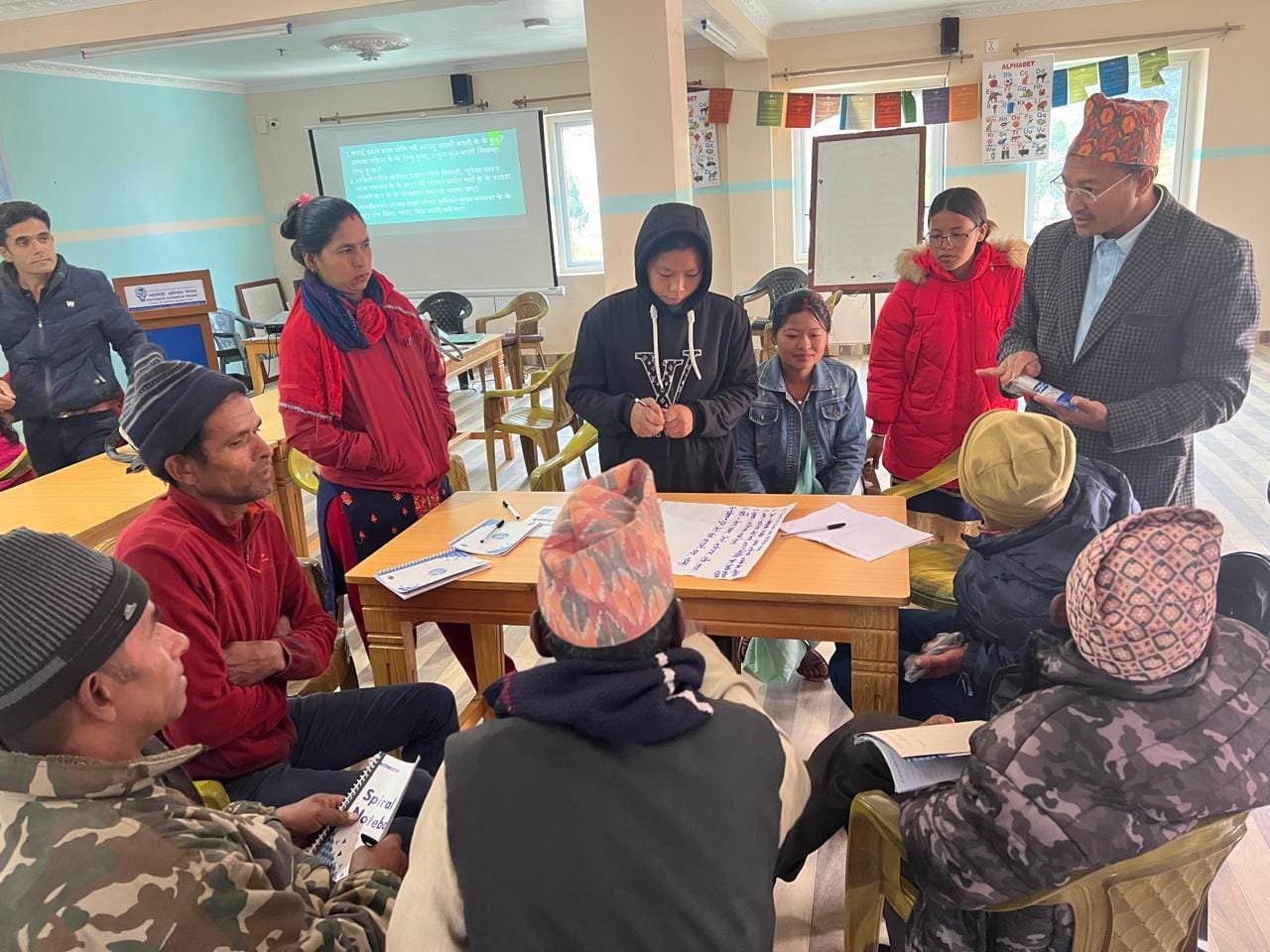
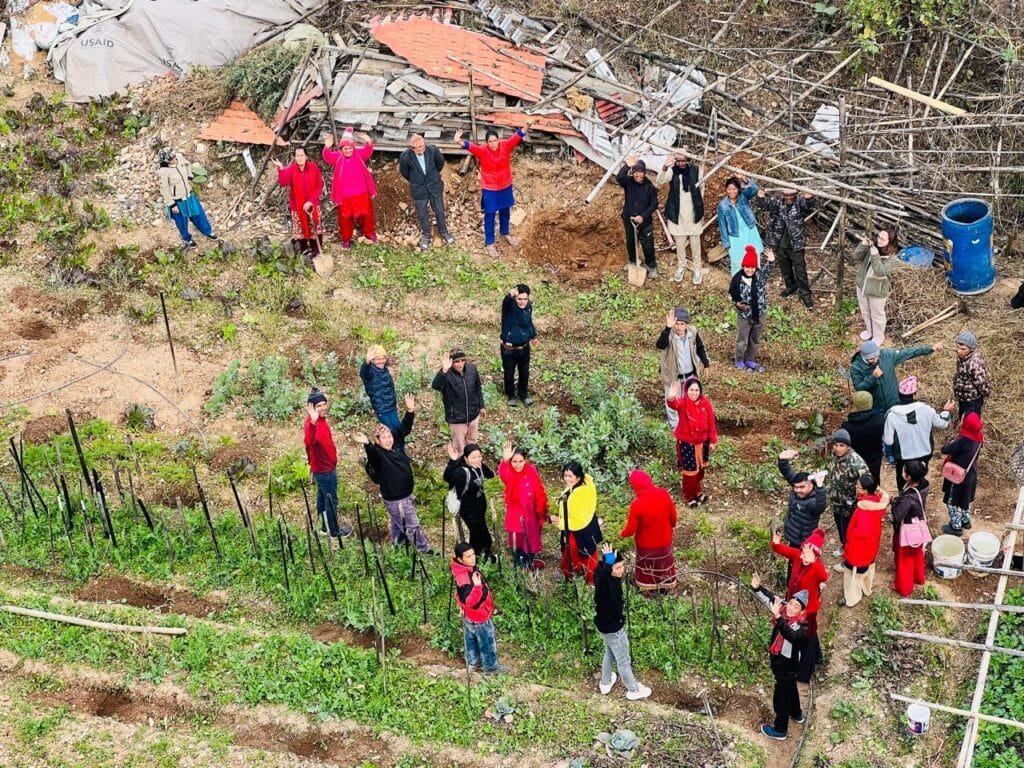 Why This Training Was Needed
Why This Training Was Needed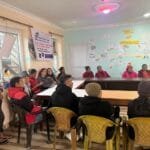
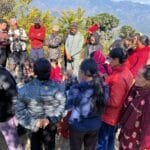
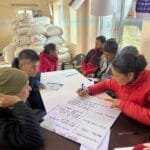
 Member of
Member of